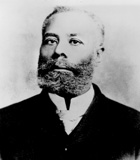
Elijah McCoy
Elijah McCoy (1843-1929) was a Black inventor who was awarded over 57 patents. The son of run-away slaves from Kentucky, he was born in Canada and lived there as a youth.
As a boy, the young Elijah was fascinated with machines and tools, learning by watching and constantly asking questions. He came to the United States after the Civil War and settled near Ypsilanti, Michigan, where he worked in a machine shop, further increasing his mechanical knowledge and skills.
During this period, steam power was rapidly being harnessed as a prime industrial power source. It was the era of the machine age, a period from about 1865 to the early l900’s, where the spirit of invention was at its highest in history. Many of the inventions of the day involved numerous moving parts requiring lubrication. with all the ingenious devices invented, no one had yet solved the problem of getting oil to moving parts without first having to shut the machinery down, especially railroad engines. In 1870, McCoy started working on the problem.
In 1873, he developed a small, oil-filled container with an adjustable stop-cock that was capable of automatically oiling moving parts while machinery was still in motion. No longer did railroad engines have to stop every few miles while a work-man went around with an oil can oiling all of the parts. No longer did factory machinery have to be shut down for similar maintenance. McCoy’s invention literally revolutionized the railroad industry as well as continuously running factory machinery. His invention was so reliable that it prompted buyers of his device to ask, “Is this the real McCoy?”, recognizing that McCoy’s competitors were trying unsuccessfully to duplicate his product. His devices were used for years on both stationary and loco-motive machinery in the West, especially the great railway locomotives, on steamships and in factories around the world (1).
He eventually set up the Elijah McCoy Manufacturing Company in Detroit, Michigan to develop and sell his inventions (2). The continuous hum of so many of the factories of today are due in most part to a self-taught mechanical engineer, son of fugitive slaves who had to leave the U.S. in order to be free.